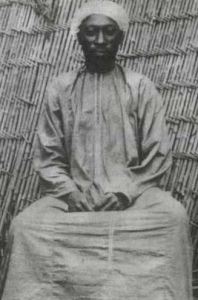The Jewish Warrior-King of Africa
Semei Kakungulu (1869-1928) was born into the African tribe of Baganda. As a young man he was converted to Christianity by a missionary. Meanwhile, he grew to become a skilled warrior, as well as an influential politician. The British supported him, essentially turning him into the unofficial king of the Busoga region, which he conquered for the Empire along with other territories. However, the British did not want to confer any titles on him, fearing he would become too powerful. This strained the relationship, and soon Kakungulu also abandoned Protestant Christianity, further driving a wedge between him and the British. Having begun to study the Bible on his own, Kakungulu recognized that Christians had misinterpreted and manipulated it, for example changing the day of the Sabbath to Sunday despite the fact that the text explicitly says it must be Saturday. According to lore, Kakungulu isolated himself in a room with the Bible, and emerged some time later with the book torn in half, concluding that only the first half (the Old Testament) must be true. In 1919, he circumcised himself and his son, urging his followers to do the same. He started a new community focused on following the laws of the Torah. Starting in 1925, the growing community encountered a number of Orthodox Jews from Europe who were working and traveling in the area. One of them, a man named Joseph, taught the community (now known as the Abayudaya) proper Jewish rituals and prayers, the Hebrew language, and even showed them how to slaughter and prepare kosher meat. Soon after, the community dropped any remaining aspects of their former Christian faith, and properly converted to Judaism. Kakangulu wrote a Jewish manual for Africans, and was able to inspire as many as 8000 followers in his time, building a network of some 36 synagogues in the region. His descendants continue to thrive in today’s Uganda. Click here to read more about them.
Words of the Week
In those days it shall come to pass, that ten people, of all the nations of the world, shall grab onto the clothing of a Jew, and say: “We will go with you, for we have heard that God is with you.”
– Zechariah 8:23, as quoted by Kakungulu in response to a Christian missionary.



